Nurturing Healthy Futures: A Holistic Approach to Children's Wellbeing

Every mother knows that her love is the cornerstone of her child’s bright and thriving future. This Children’s Day, we celebrate not only the joy and innocence of our little ones but also the incredible strength and dedication of mothers who work tirelessly to nurture their children’s wellbeing.
Celebrate Children's Day by embracing balanced nutrition, active lifestyles, mental wellness, and strong gut health

A Holistic Approach to Child Wellbeing
Nurturing a child’s health goes beyond just taking care of physical ailments. It involves a holistic approach that includes nutrition, mental health, physical activity, and emotional support.
“The United Nations advocates for a holistic approach to child development, highlighting that proper nutrition, physical activity, and emotional support are essential for building resilient, thriving communities.”
Here are some key areas to focus on to ensure a healthier present and future for our children:
1. Balanced Nutrition
A balanced diet is fundamental for a child’s growth and development. Incorporate a variety of fruits, vegetables, whole grains, and lean proteins into their meals. Avoid processed foods high in sugars and unhealthy fats. Educating children about healthy eating habits early on can set the foundation for lifelong wellness.
2. Physical Activity
Regular physical activity is essential for maintaining a healthy weight, strengthening bones and muscles, and boosting mental health. Encourage your children to participate in sports, dance, or simply play outside. Aim for at least an hour of moderate to vigorous physical activity each day.
3. Mental and Emotional Wellbeing
A child’s mental and emotional health is just as important as their physical health. Create a supportive environment where they feel safe to express their feelings. Teach them coping skills for stress and anxiety. Activities like mindfulness, meditation, and breathing exercises can help children manage their emotions better.
4. Gut Health
While nutrition and physical activity are crucial, gut health also plays a significant role in a child’s overall wellbeing. A healthy gut supports better digestion, stronger immunity, and even improved mood and behavior. Incorporating probiotics into your child’s diet through foods like yogurt, fermented foods, or supplements can help maintain a healthy gut flora.


5. Adequate Sleep
Sleep is vital for a child’s physical and cognitive development. Establish a regular bedtime routine to ensure they get enough rest. Children typically need more sleep than adults, with recommendations varying by age.
6. Hydration
Ensure your child drinks plenty of water throughout the day. Proper hydration is essential for maintaining energy levels, supporting digestion, and regulating body temperature.
7. Social Connections
Healthy social interactions are crucial for a child’s emotional and social development. Encourage your child to build and maintain friendships. Activities like team sports, playdates, and family gatherings can help foster these connections.
Practical Tips For Parents
- Lead by Example: Children often mimic their parents’ behavior. Demonstrate healthy eating, regular exercise, and positive coping strategies.
- Create a Routine: Consistency helps children feel secure. Establish regular meal times, bedtimes, and family activities.
- Educate and Empower: Teach children about the importance of health and wellness. Empower them to make healthy choices on their own.
- Limit Screen Time: Excessive screen time can negatively impact physical activity and sleep. Set boundaries for the use of electronic devices.
- Be Supportive: Encourage and support your children in their interests and activities. Celebrate their achievements and provide comfort when they face challenges.
Strong Mothers, Healthy Futures: Mega Lifesciences' Commitment
Mothers play a vital role in shaping the health and future of their children. By adopting a holistic approach to health that includes balanced nutrition, physical activity, mental and emotional support, and good gut health, we can ensure our children grow up healthy and happy. This Children’s Day, let’s commit to nurturing their present and supporting their dreams for a brighter future.
At Mega Lifesciences Nigeria, we are dedicated to supporting happy, healthy motherhoods to ensure that every child can thrive. We remain committed to closing the gaps in child and mother nutrition, providing the resources and products needed to foster well-being. Together, we can build a foundation for healthier, more vibrant futures for all children.
For more insights on nurturing your child’s health and wellbeing, visit Normagut.
Happy Children’s Day to all the amazing moms and their precious children!
Prioritizing Women's Health In Nigeria: International Day of Action for Women's health 2023
By Anand Kamble

Empowering Change for a Brighter Future
Today, on May 28th, we celebrate the International Day of Action for Women’s Health. This day serves as a reminder of the urgent need to address the unique health challenges faced by women globally, including in Nigeria. With a population of over 200 million people, Nigeria faces numerous challenges when it comes to women’s health. Access to quality healthcare is limited, with only 5% of the country’s GDP being allocated to the health sector. This lack of funding leads to a shortage of healthcare workers, medical supplies, and facilities, resulting in limited access to healthcare for many Nigerians, particularly women.

Unbreakable Strength: Nigerian Women Leading the Charge for Health and Empowerment
It is undeniable that Nigerian women are among the most hardworking women in the world. They play a critical role in the social, economic, and political development of the country, often taking on multiple roles as wives, mothers, caregivers, and breadwinners.
Nigerian women have been at the forefront of many socio-political movements in the country, fighting for women’s rights, gender equality, and access to education and healthcare. They have demonstrated remarkable resilience and strength in the face of adversity, overcoming numerous challenges and barriers to achieve their goals.
Despite facing numerous health challenges, including maternal mortality, anemia, and gender-based violence, Nigerian women continue to work hard to improve their own health and that of their families. They are active in community-based health initiatives, promoting healthy behaviors and practices and advocating for better access to healthcare services.
Rise Strong, Thrive Together: Empowering Nigerian Women for Maternal Health and Family Planning
One of the most significant health challenges faced by women in Nigeria is maternal mortality. According to the World Health Organization (WHO), Nigeria accounts for approximately 20% of global maternal deaths, with an estimated 512 deaths per 100,000 live births. This high maternal mortality rate is often attributed to inadequate access to quality obstetric care, including emergency obstetric care.
Access to family planning services is also limited in Nigeria. According to the Nigerian Demographic Health Survey, only 12% of women in Nigeria use modern contraceptives, which can lead to unintended pregnancies, unsafe abortions, and other reproductive health problems. Women must be empowered to take charge of their health and wellbeing. Health education and awareness programs must be provided to women in Nigeria, particularly those in rural areas, to help them make informed decisions about their health and access available healthcare services.
Anemia in Nigeria: A Critical concern for Women
Anemia is another significant health challenge that affects women’s health in Nigeria. Anemia is a condition where there is a deficiency of red blood cells or hemoglobin in the blood, leading to fatigue, weakness, and other health problems.
In Nigeria, anemia is prevalent among women and children. According to the Nigerian Demographic Health Survey, 67% of children under the age of five and 42% of women of reproductive age are anemic.
The high prevalence of anemia among women is often attributed to poor nutrition, particularly the lack of iron-rich foods in their diet, and poor access to healthcare services. Anemia can also be caused by parasitic infections, such as malaria, which is endemic in Nigeria.
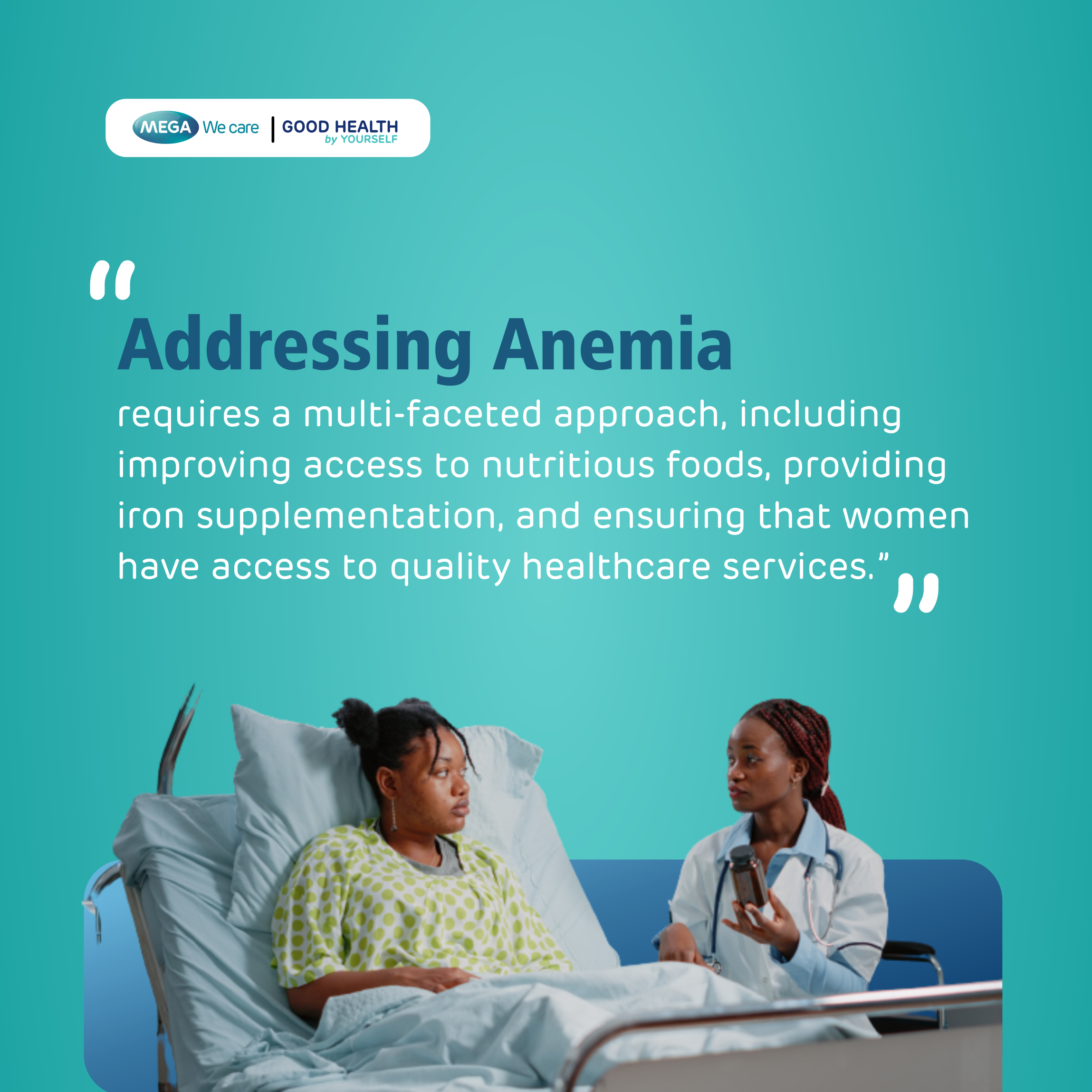
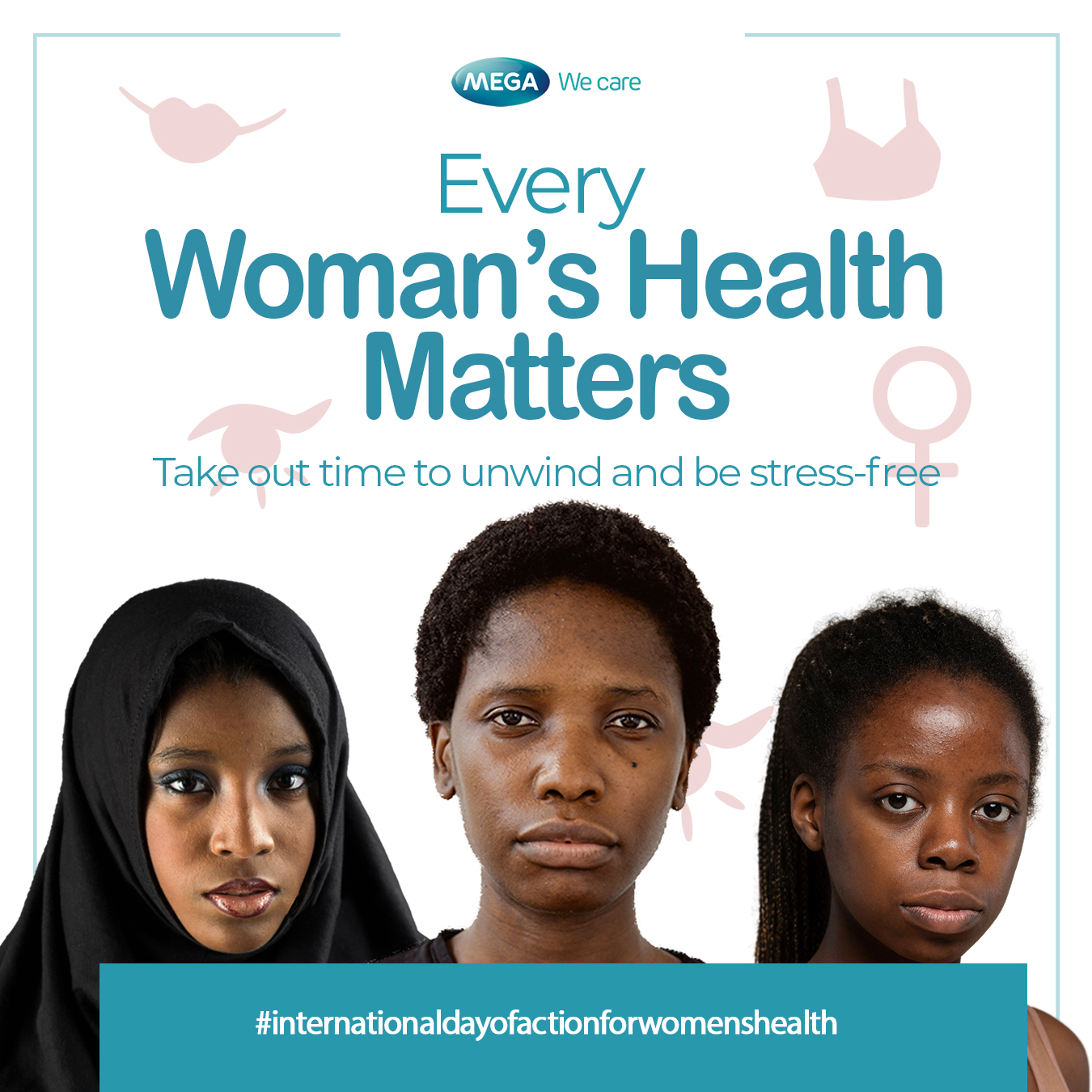
Conquering Anemia's Grip and Nurturing Vitality
Addressing anemia requires a multi-faceted approach, including improving access to nutritious foods, providing iron supplementation, and ensuring that women have access to quality healthcare services.
Efforts must be made to increase awareness about the importance of a balanced diet rich in iron and other essential nutrients among women in Nigeria, particularly those in rural areas. Nutrition education and counseling services must be provided to women to help them make informed decisions about their diet and improve their nutritional status.
In addition, iron supplementation programs must be made widely available to women, particularly during pregnancy and breastfeeding, as this is a critical period for ensuring optimal health outcomes for both mother and child.
Efforts must also be made to address parasitic infections such as malaria, which is a leading cause of anemia in Nigeria. Malaria prevention and control programs must be strengthened, including the use of insecticide-treated bed nets and prompt diagnosis and treatment of malaria infections.
Supporting Women's Health: Our Dedication in Action
Mega Lifesciences actively supports women’s health in Nigeria by participating in campaigns focused on pregnancy and motherhood. Collaborating with government hospitals across the country, under our Good Health by Yourself initiative (GHBY) we are committed to providing comprehensive care and resources to women during this crucial phase of their lives. Our buzzing involvement aims to catch the attention of our audience and emphasize our dedication to making a real difference in women’s health.
Our vision to help people stay healthy as long as they live is driven through strategic partnerships including our Happy Motherhood campaign which has reached over 3000 women in the last 3 years. We offer health education to drive essential prenatal care, guidance on postpartum well-being, and various initiatives to ensure Nigerian women receive the quality healthcare they deserve even beyond pills. We’re committed to continuously champion women’s health, building a healthier and happier future for mothers throughout the nation.
International Day of Action for Women's Health: Together for Health
On this International Day of Action for Women’s Health, let us further reinforce our commitment to working together with the medical community to address the health challenges faced by women in Nigeria, including anemia. By improving access to nutritious foods, providing iron supplementation, and strengthening malaria prevention and control programs, we can work towards building a healthier, more resilient Nigeria for all women.
World Liver Day 2023: Together for Liver Health

Why Liver Health Should Be Priority
Rightly named the ‘small superhero’ of the human body, the liver works 24/7 to keep our body processes running smoothly. Of its 500-odd functions, the most important ones are related to digestion and metabolism.
When your liver is doing well, your body utilizes food and excretes waste efficiently, and your metabolism remains quick and steady. When your liver starts getting damaged and can’t repair itself enough, the digestion system falters and the metabolism becomes sluggish.
World Liver Day is celebrated annually on April 19th to raise awareness about liver diseases and the importance of liver health. We take this moment to highlight the alarming statistics surrounding liver health in Nigeria. According to the World Health Organization (WHO), Nigeria has one of the highest rates of liver diseases in the world, with over 20 million Nigerians estimated to be living with liver disease.
Liver diseases in Nigeria are often diagnosed late, leading to poor outcomes, high morbidity, and mortality rates. Furthermore, the inadequate awareness and poor knowledge of liver diseases among the Nigerian population, contribute to the poor health outcomes associated with liver diseases. On this World Liver Day 2023, we must prioritize raising awareness about liver health in Nigeria and implementing measures to improve liver disease prevention, diagnosis, and management.
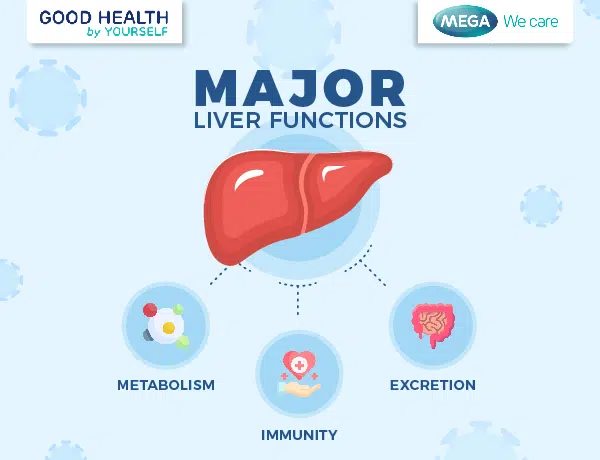
Major Liver Functions: Reasons Why Liver Health is Important
1. Metabolism
The liver helps convert the nutrients you eat into energy. It also stores carbohydrates and maintains blood sugar levels. The ingested carbs are broken down and stored in the liver. In case your blood sugar level is low, the liver releases this sugar in the blood. If your sugar levels are high, then it does the exact opposite.
The liver also converts amino acids into energy and uses them for the production of other nutrients like carbs and fats. Moreover, the liver utilizes micronutrients like Vitamin K for the production of proteins that are essential for the blood-clotting process.
2. Immunity
The liver houses a large number of immune cells. This means that the liver can activate the immune system via these cells very quickly. At the same time, the liver has various mechanisms in place that prevent the unwanted activation of your immune system.
3. Excretion
The liver helps in the conversion of amino acids to energy. During this conversion, a byproduct called ammonia is produced. Ammonia is highly toxic and can damage the body if allowed to accumulate. The liver detoxifies this ammonia into a safer compound called urea, which is excreted from the body by the kidneys. In addition, the liver filters and removes toxins from your body.
With the liver being involved in so many different bodily functions, any harm to it will disrupt your well-being. It’s time to start being kind to your liver.
How to maintain good liver health
1. Keep that water bottle handy!
When thinking of staying healthy, most people think about liver food choices — consuming adequate amounts of good carbohydrates, proteins, unsaturated fats, and micronutrients — and timely meals. But they may not stop to think if they’re drinking enough water. Drinking the correct volume of water daily is necessary to maintain liver health.
As mentioned before, your liver plays a pivotal role in filtering out toxins and converting harmful substances into safe waste products. Being in constant contact with these toxins and metabolites can take a toll on your liver. Drinking the recommended 2 liters of water a day enables the liver to flush out these toxins more easily; the hydration encourages the secretion of bile, which is key to liver functions.
2. Put that wine glass aside
Pouring yourself a glass of wine or mixing yourself some rum or whisky once in a while won’t harm your liver. But constantly dumping alcohol into your system will damage your liver, and perhaps damage it permanently. Therefore, say “no” to alcohol more often than you say “yes”, for good liver health.
Processing the alcohol in your drinks causes some damage to the liver tissue. Since this unique organ can regenerate its tissues, it can recover from the temporary damage caused by occasional drinking or minimal daily drinking, especially if the liver is helped along by the intake of water in between alcoholic drinks. Excessive and regular alcohol drinking, however, may lead to liver cirrhosis.
Liver cirrhosis doesn’t occur overnight. It progresses in stages and can be divided into 3 stages.
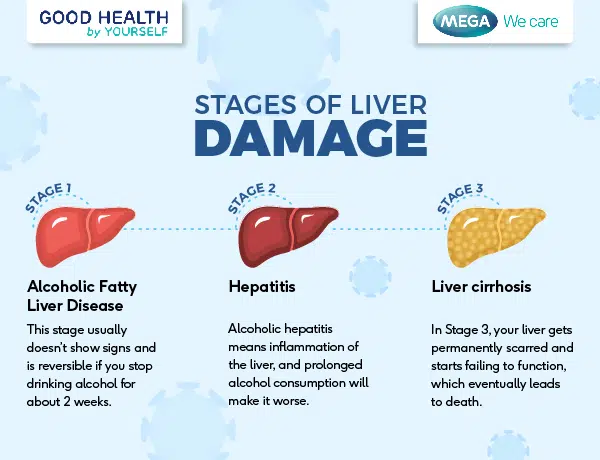
Stages of liver damage
1. Alcoholic Fatty Liver Disease
Heavy consumption of alcohol, even for a few days consecutively, can cause a build-up of excess fat. This can lead to Alcoholic Fatty Liver Disease (AFLD) and is Stage 1 of alcohol-related liver disease. This stage usually doesn’t show signs and is reversible if you stop drinking alcohol for about 2 weeks.
2. Hepatitis
As mentioned above, Alcoholic Fatty Liver Disease is usually asymptomatic. However, if left unchecked, AFLD progresses to alcoholic hepatitis, which is Stage 2. Alcoholic hepatitis means inflammation of the liver, and prolonged alcohol consumption will make this condition worse.
3. Liver cirrhosis
The last and final stage of liver damage is liver cirrhosis. In Stage 3, your liver gets permanently scarred and starts failing to function, which eventually leads to death. Progression to this stage is commonly seen in alcohol addicts.
Indeed, alcohol, consumed in any way or form, is injurious to your overall health. Apart from liver damage, it affects your kidneys, too. Drinking regularly can lead to chronic kidney disease, along with liver damage.
Try limiting your intake of alcohol. Experts recommend drinking no more than 2 drinks a day or 10 drinks a week. What really matters is the alcohol content of your drink, e.g. “80 proof” on the label means 40% alcohol in the drink. The higher the content, the less you should drink.
Conclusion
The liver is one of the most vital organs in the human body. Being involved in digestion, metabolism of nutrients, immunity, and excretion of waste products, the liver is constantly under significant stress. If you burden it with a poor lifestyle, then you’re paving the way for a world of pain. Liver cirrhosis, hepatic cancer, and liver failure are at the end of this road.
It’s time to lighten the load on your liver. Ditch those junk food take-outs and cold beers. Instead, try and have some scrumptious veggies, fruits, and whole grains. Having a well-balanced diet and keeping yourself hydrated goes a long way in preserving hepatic health.
Check-ups, destressing activities, exercise, and sleep round off the list of things you should do to maintain liver health. Try and adopt these tips in your daily life for preserving your health.
The Future of Healthcare
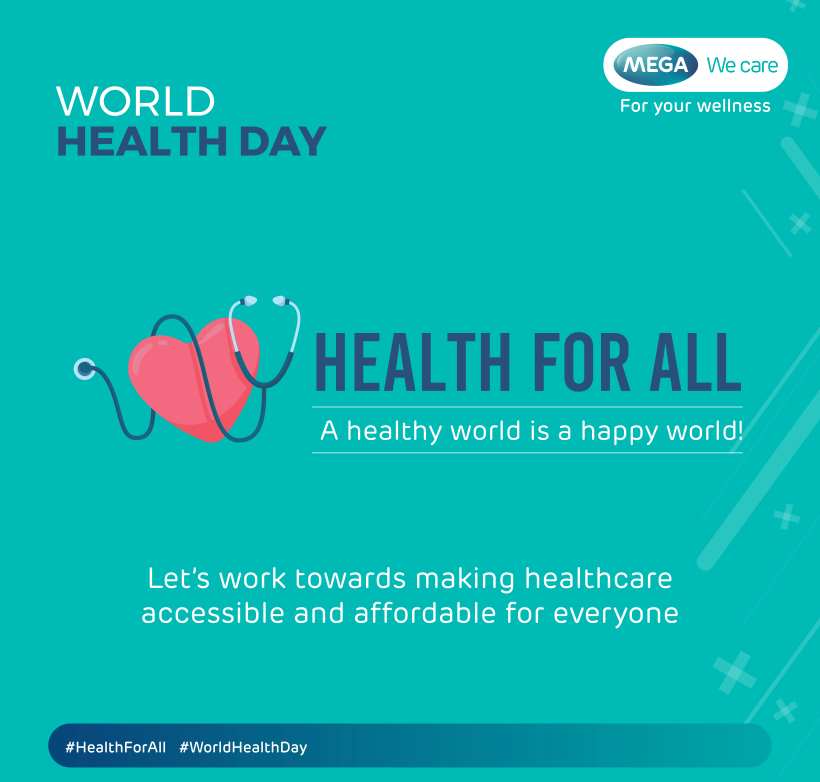
Towards a Healthier Nigeria
Concerning Healthcare, what is the reality in Nigeria? The high cost of healthcare is a luxury beyond reach for many. A survey conducted by Nigeria’s National Bureau of Statistics found that 67.5% of Nigerians who needed healthcare in the past year did not seek medical attention because they could not afford the cost of treatment.
Nigeria’s healthcare system is faced with numerous challenges ranging from insufficient funding, shortage of healthcare professionals to poor healthcare infrastructure all of which takes its toll on the resulting poor health outcomes. The heartbreaking consequences are felt most acutely by the most vulnerable in society, who are left to suffer without the care they need. However, the future of healthcare in Nigeria is changing, and there is a growing emphasis on healthy ageing.
The Way Forward: The Need for a Paradigm Shift in Healthcare Delivery
According to the World Health Organization, the proportion of the global population over 60 years of age is expected to double from 12% to 22% by 2050. Nigeria is no exception to this trend. This demographic shift will bring about new challenges in healthcare delivery, including a rise in non-communicable diseases such as diabetes, hypertension, and cancer. It is therefore essential that healthcare delivery shifts towards healthy ageing. By doing so, Nigeria can achieve better health outcomes, improve healthcare access, and secure a healthier future for its citizens. Consequently, there is a need for a more proactive approach that focuses on preventive care and healthy ageing.
In Nigeria, healthcare delivery has traditionally focused on treating illnesses rather than promoting healthy lifestyles. However, with the rise of chronic diseases, there is a need for a paradigm shift in healthcare delivery. This shift should prioritize preventive care, wellness, and healthy ageing.
Healthy ageing would present an avenue to optimize opportunities for physical, social, and mental well-being in such a way that enables older people to take an active part in society. Healthy ageing has a significant impact on healthcare by reducing the burden of chronic diseases, enhancing quality of life, and increasing productivity. Essentially, The future of healthcare in Nigeria lies in promoting healthy ageing and improving healthcare access.
The Way Forward: The Need for a Paradigm Shift in Healthcare Delivery
According to the World Health Organization, the proportion of the global population over 60 years of age is expected to double from 12% to 22% by 2050. Nigeria is no exception to this trend. This demographic shift will bring about new challenges in healthcare delivery, including a rise in non-communicable diseases such as diabetes, hypertension, and cancer. It is therefore essential that healthcare delivery shifts towards healthy ageing. By doing so, Nigeria can achieve better health outcomes, improve healthcare access, and secure a healthier future for its citizens. Consequently, there is a need for a more proactive approach that focuses on preventive care and healthy ageing.
In Nigeria, healthcare delivery has traditionally focused on treating illnesses rather than promoting healthy lifestyles. However, with the rise of chronic diseases, there is a need for a paradigm shift in healthcare delivery. This shift should prioritize preventive care, wellness, and healthy ageing.
Healthy ageing would present an avenue to optimize opportunities for physical, social, and mental well-being in such a way that enables older people to take an active part in society. Healthy ageing has a significant impact on healthcare by reducing the burden of chronic diseases, enhancing quality of life, and increasing productivity. Essentially, The future of healthcare in Nigeria lies in promoting healthy ageing and improving healthcare access.
Good Health By Yourself: An initiative of Mega We Care
The Good Health By Yourself initiative by Mega Lifesciences is an excellent example of one of such collaborations. The initiative is an extension of Mega We Care’s efforts to offer people a chance at a better, healthier life, and encourage people to take health into their own hands, starting early. The initiative remains passionate about creating access to free screenings, health education, partnerships and community outreaches, where healthcare practitioners champion the drive for better health on various levels.
Towards a Healthier Nigeria: The Way Forward
The future of healthcare in Nigeria lies in promoting healthy ageing and improving healthcare access. By prioritizing preventive care, wellness, and healthy ageing, Nigeria can reduce the burden of chronic diseases and improve the quality of life of its citizens. To achieve this, there is a need for trusted collaborations between healthcare providers, pharmaceutical companies, and government agencies, as well as increased investment in healthcare infrastructure and policies that support healthy ageing.
The challenges facing healthcare in Nigeria cannot be solved by a single entity. Trusted collaborations are the way forward, and we at Mega Lifesciences are committed to lending our continuous support with initiatives, partnerships, products and services that seek to address the gaps in Nigeria’s healthcare delivery system. We Care to work towards a future where healthy ageing is a reality for all Nigerians, we care to help Nigerians stay healthy as long they live.
Achieving Healthy Ageing in Nigeria: Collaborations can drive Healthcare access
To achieve healthy ageing in Nigeria, there is a need to prioritize preventive care, promote healthy lifestyles, and improve healthcare access. This can be achieved through policies that support healthy ageing, increased investment in healthcare infrastructure, and public-private partnerships. Partnerships have the potential to create innovative solutions that address the gaps in Nigeria’s healthcare delivery system.
Trusted collaborations between healthcare providers and pharmaceutical companies can play a pivotal role in improving the health of Nigerians. By providing access to healthcare programs, such as free health screenings and community outreaches, these collaborations can help individuals make informed decisions about their health. A focus in this direction can help reduce the burden of NCDs on the Nigerian healthcare system attempting to address the 29% of Death accrued to non- communicable diseases according to the World Health Organization.
Prioritizing Women's Health In Nigeria: International Day of Action for Women's health 2023

Lorem ipsum dolor sit amet, consectetur adipiscing elit. Ut elit tellus, luctus nec ullamcorper mattis, pulvinar dapibus leo.
